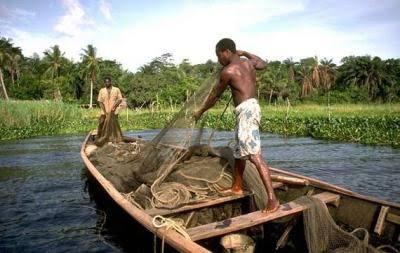FINDING FISH: How contaminated seafood threatens lives and livelihoods in Niger Delta
At 70, Tabu can no longer brave the Atlantic Ocean in search of the large catches that once fed his family and earned him a living. Now, out of sheer necessity, he washes oil-stained fish with water from the same polluted creek before cooking them for his meals.
“Every living creature was affected,” says Chief Nadabel, the leader of Nweemuu, a nearby fishing village. His voice is marked by grief for what his people have lost and what they continue to endure.
A two-hour trip from Port Harcourt to Bodo offers a glimpse of a region still marred by the aftermath of devastating oil spills from 2008 and 2009. At Bodo’s busy jetty, rickety boats shuttle people across creeks, passing mangroves where cleanup teams in orange vests work under the watchful eyes of military patrol boats.
But the 15-minute boat ride to Nweemuu paints an even more dismal picture. Fishing boats lie idle along the shore. Nets hang unused on withering trees. Structures that once buzzed with activity are now incomplete, crumbling, and engulfed by weeds, silent reminders of a community that’s mostly vanished.
“Before the pollution, this place had a population of over 1,300 people,” Chief Nadabel says. “Today, we’re barely over 130 residents.”
The numbers reflect the stark reality already visible: once oil contamination wrecks fishing grounds, whole communities collapse. Families who had lived off these waters for generations have abandoned their homes, heading to cities in search of a new beginning.
The Niger Delta was once considered among the world’s most valuable wetlands, rich in biodiversity. Over 70 percent of the local population relied on fishing, agriculture, and forestry industries tightly woven into the region’s economy.
These waters were the lifeblood of fish markets and processing hubs, traditional canoe carving, and net making. The surrounding mangrove forests also offered economic benefits palm wine, local gin, and palm oil for commercial use. Oil spills don’t just poison the water; they shatter entire livelihoods.
Abel Naana, a 50-year-old fisherman from nearby Mogho community, has lived through this devastation. Fishing was his family’s heritage, passed down from grandfather to father to son. “Back when things were normal, fishing was a way of life,” he says. “We fished both morning and night.”
The trade was so rewarding that fishermen built shelters along the riverbanks for easy access to work and rest. Naana used his income to marry, raise children, and build a home. But since the 2008–2009 disaster turned the Bodo River into what he calls “a floating graveyard for marine life,” that way of life has disappeared.
“Looking at my house now reminds me of the life I lost—stolen by those oil spills,” he says, standing outside the home built from years of fishing. “And with the corruption around the cleanup efforts, I fear the fish may never come back.”

